- Home
- Michelle Hodkin
The Evolution of Mara Dyer Page 24
The Evolution of Mara Dyer Read online
Page 24
I was shocked but thrilled by this development. “What brought this on?”
Dad shook his head. “We never wanted you to live somewhere else. We love having you home, kid. We just want you healthy and safe.”
A worthy goal. I had no protest.
The thing about happiness, though, is that it never lasts.
When I walked into Horizons I was handed a worksheet, which turned out to be a test. A sociopath test, if the questions were any indication. It was obvious which answer you were supposed to provide when prompted to choose—those tests always are—so I answered benignly, growing slightly uncomfortable about the fact that most of my real answers were not particularly nice.
Do you lie or manipulate others when it suits your needs or to get what you want?
A) Sometimes
B) Rarely
C) Often
D) Never
Often. “Rarely,” I circled.
Do you feel that the rules of society don’t apply to you, and will you violate them to accomplish your goals?
Sometimes. “Never,” I chose.
Do you easily talk your way out of trouble without guilt?
Often. “Rarely.”
Have you killed animals in the past?
Sometimes, I was loath to admit. “Never,” I chose.
And on it went, but I tried not to let it sour my mood. When I sat down for Group, I was able to maintain my golden bubble for a little while longer, even though everyone’s tiny miseries kept pressing up against it. I clenched my mouth against the snark and made sure my inner monologue stayed inner; I didn’t want anything to derail my Get Out of Inpatient Treatment Free pass.
Jamie looked like he was having as hard a time with all the sharing today as I was after one of Adam’s standard narcissistic diatribes, so when we broke for snack time I edged over.
“I hate that guy,” I said, grabbing a cookie.
“Yeah,” was all I got out of him, quite uncharacteristically. He filled a glass with water and sipped it very slowly.
I sat on the couch beside him. “Who died?” I asked.
There was a thin film of sweat on his forehead, which he wiped with the back of his sleeve. “Anna Greenly.”
“Wait—Croydian Anna?”
“The very same.”
I stared at him for a beat, waiting for the punch line. Then realized there was none.
“Seriously?” I asked quietly.
“Careened off an overpass. Drunk.”
“I’m . . .” But I didn’t know what I was. I had no idea what to say. You say you’re sorry when someone loses a person they love. Not a person they hate.
“Yeah,” Jamie said, though I hadn’t said anything. He did not look well.
“You okay?” I asked softly.
He shrugged. “I have a stomach thing. Don’t get close.”
“Well, now you’ve spoiled everything,” I said casually, working hard to fake it. “I was planning to seduce you in the broom closet.” I pointed. “Right there.”
A joyless smile appeared on Jamie’s lips. “We are far too screwed-up for a goddamned love triangle.”
That’s my Jamie.
After a minute of silence, he said, “You know how every now and then there’s a news story about kids being bullied into suicide?”
I did.
“Someone always says, ‘Kids are mean.’ ‘Kids will be kids.’ Which implies that the kid bullies will grow out of it someday.” The muscles in his jaw tightened. His stare was unfocused and far away. “I don’t think they do. I think kid bullies turn into adult bullies and it pisses me off that I’m expected to feel sad because one of them is gone. Anna was like . . . like a social terrorist,” he said, staring at the floor. “Aiden too.” His nostrils flared. “I was in that cesspool of douchebaggery with them for seven years and there was a lot—whatever. Let’s just say beating the shit out of me and having me unjustly expelled from school wasn’t the worst of it.” A wave of something passed over his face but he said nothing else.
I tried to catch his eye. “Misery’s no fun if you keep it to yourself.”
“Ain’t that the truth,” he said, but didn’t look up. “My parents asked if I wanted to go somewhere else for ninth grade but”—he waved his hand—“you know it doesn’t matter. There’s always one or two or five of them and I was short and a nerd and a minority in every major way and that’s more than enough reason to be picked on.” He exhaled through his nose. “But you know what their real problem with me was? I never wanted to be one of them. That’s what bothers bullies the most.”
Jamie stared at the near empty glass in his fist, gripping it tightly. “Of course, you can’t say any of this out loud, or people will clutch their pearls and call you a monster.”
I thought of my less-than-honest answers on this morning’s assignment and nudged my friend with my shoulder. “Not me. I took the sociopath test this morning. I only got three out of ten non-sociopath results.”
“That’s plenty.” Jamie flashed a weak half-smile, deepening his dimple, then went on. “I’m sure she had a redeeming quality or two and her family and sycophantic friends will miss her dearly. And if she were sitting here now talking about me, I’d probably feature in her narrative as a Moor out to steal all da white ladies.” He shrugged a shoulder. “I just can’t muster up the energy to feel shitty. I don’t really want to. She wouldn’t want my pity, even if she had it. You know?”
“I do,” I said, because I did.
He looked at the wall in front of us, at a ridiculous motivational poster with an eagle skimming the water, triumphantly clutching a fish in its talons. “A little dark for dear little Jamie?”
“No,” I said.
“No?”
“Your love of Ebola tipped me off,” I explained. “And you’re not so little, either.”
He inclined his head slightly, with a smile to match. Then he stood. “I am going to go throw up now. Enjoy your cookie.”
Jamie left but I just sat there, feeling vaguely nauseated myself.
His words unlocked something inside of me and images of corpses bobbed up in my mind.
Morales. Would I have killed her for failing me if I knew what I was doing? No. But was I sad that she was dead?
The brutal, honest answer was no. I was sorry that I might’ve killed her, but I barely thought about her at all.
And Mabel’s owner. If he was alive, she wouldn’t be. Or she’d be suffering still, with gaping wounds in her neck infested by maggots as her body consumed itself, as she died slowly in the miserable heat. But because he was dead? She was spoiled and fat and happy and loved. Her life was worth more than his.
And then, of course, there was Jude. Who trapped me. Pushed me. Forced me. And tortured me, now that he wasn’t dead after all.
I wasn’t sorry that I tried to kill him. I was sorry he was still alive. I would kill him again if I had the chance.
47
JAMIE WAS SENT HOME EARLY AFTER ONE OF THE counselors heard him throwing up in the bathroom. I was not so lucky. At lunch, I sat down next to Stella, who picked idly at her loaded sandwich. I started inhaling mine; the cookies from snack time were stale and store-bought, but the food they served in the dining room was addictive.
But then Phoebe sat across from us and began watching me intently. She scribbled in her journal, chewing on her fingernails as she scratched away, creating a little pile on the table.
Appetite gone. “That’s gross, Phoebe.”
“It’s for the voodoo doll,” she answered, her smile spreading like a stain. “It looks just like you.”
You can’t respond to a statement like that. There’s just nothing to say.
A weird look settled over Phoebe’s weird face and she leaned forward. “Gimme your hair,” she said to me.
Stella stood suddenly, and pulled me away from the table.
“I’m telling my boyfriend!” Phoebe shouted after us.
It was all so screwed up that it was
almost funny. I told Stella as much and she dropped my arm. That was when I noticed the bruise. An oil slick of colors, peeking out from beneath her sleeve.
“You okay?” I asked her, staring at it. She tugged her sleeve down, and when I met her eyes, her face was a mask.
“It’s nothing,” she said blankly. “Are you okay?”
I must have looked confused, because she nodded at the table. “Phoebe—” she said.
“Oh. I’m getting used to her shenanigans, I think.” I shrugged.
Stella didn’t say anything. Then, “She was getting intense.”
“Phoebe’s definitely not one of my favorite people.”
Stella looked at me for a beat and said, “Be careful, okay?”
I was about to ask what she meant, but Dr. Kells appeared behind us and called out my name.
“Mara. Just the person I wanted to see.” She looked from me to Stella and then back to me. “Are you busy at the moment?”
Stella offered a small wave, and walked away. Damn.
“No,” I said. Wish I was.
“Can you step into my office for a sec?”
Let’s get this over with.
“I wanted to check in with you,” Dr. Kells said with a benevolent smile. “How are things?” She lowered herself into her chair.
“Fine.” I said nothing more. She said nothing more. A common psychologists’ trick, I knew—she who speaks first loses. I was an expert at this game now.
I felt the urge to yawn. I tried to stifle it, but eventually biology took over.
“How are you sleeping?” Dr. Kells asked.
“Okay.” It was kind of true. I’d woken up in my own bed two days in a row. That should count for something.
She studied my face. “You look pretty tired,” she said.
I shrugged. A non-answer.
“And thin. Are you dieting?” she asked me.
I shook my head.
“Maybe you’re having difficulty adjusting? Do you think you could use something to help you rest?”
I wanted to throw my head back and groan. “I’m already on a lot of pills.”
“You need your sleep.”
“What if I become addicted?” I challenged her.
It didn’t work. “The pills I’ll prescribe for you are non–habit forming, don’t worry. How are your other medications working out for you, by the way?”
“Great.”
“Any hallucinations?”
None that I’m going to tell you about.
“Nightmares?”
None that I’m going to share.
Dr. Kells leaned forward. “Nothing unusual at all?”
“Nope,” I said, smiling. “Completely normal.” A complete lie.
“And what about being here at Horizons? How do you like our program?”
“Well,” I said, feigning thoughtfulness, “I really like Art Therapy.”
“That’s wonderful, Mara. Have you been writing in your journal?”
The journal I couldn’t even remember receiving? Admitting that meant admitting to losing time. Blacking out. Big red flags that I Am Not Okay. I might as well tattoo my forehead with the words INSTITUTIONALIZE ME.
So I told Dr. Kells it was lost. Normal people lose things all the time. No big.
“Have you been more forgetful lately?” she asked.
“No,” I said, acting surprised by the question.
“Well, some of the medications could be responsible for that. I want you to pay attention and see if there’s anything else like that that you’ve noticed.” She pushed her glasses up on her nose. “Even if you don’t think something is important. I think maybe I will adjust some of your dosages,” she said, writing that down on her notepad. “What about emotionally?”
“What do you mean?”
“How are you getting along with the other students?”
“Good.”
Dr. Kells leaned back in her chair and crossed her legs; her nude pantyhose crinkled over her knees like a second, artificial skin. “How about Phoebe?”
So that was where this line of questioning was going. I sighed. “I wouldn’t say we’re friends.”
“Why do you say that?”
“Does Phoebe have any friends?” I asked her.
“Well, Mara, I’m more interested in hearing why you and she don’t get along.”
“Because she’s certifiably insane. And she’s a liar.”
“It seems like you don’t like her very much.”
I rubbed my chin. “That’s pretty accurate, yes.”
“Phoebe said you threatened her.”
“She said I threatened her?” I told Dr. Kells about the sinister I see you note Phoebe left in my bag, but, “I’ll have a talk with her,” was all Dr. Kells said.
Then she asked, “How about Adam?”
I shifted uncomfortably. I couldn’t stand him, either.
“Have you made any friends here, Mara?”
The air conditioning clicked on as the silence stretched out. “Jamie,” I suggested.
“You two knew each other from Croyden, right?”
“Yeah . . .”
“How about Tara?”
Who the heck was Tara?
“Megan?” Dr. Kells asked hopefully.
Megan. Megan of the bizarre phobias. We’d barely spoken to each other, but when I saw her I said hello—I decided to nod in response to Dr. Kells’s question, and tossed out Stella’s name for good measure. Dr. Kells didn’t seem particularly impressed.
“All right,” she said then, and waved her hand at her office door. “You’re free to go. Let’s talk again before the retreat.”
“Actually,” I said, drawing out the word. “I might not be going.” I tried not to sound smug.
“That’s too bad.” Dr. Kells looked disappointed. “Our students tend to find it rewarding. Maybe you’ll join us on the next one?”
“Definitely,” I said before grabbing my bag, thanking her for the chat, and making my escape.
It would have been nice if Anna’s death and Phoebe’s fingernails had been the worst parts of my day.
Dad drove me home and the house was quiet when we reached it—school had started again for Daniel and Joseph, and they weren’t home yet. Mom was probably still working. With Noah in Rhode Island until tomorrow, I found myself confined in the house with nothing to do.
So I settled on research. I passed my grandmother’s portrait in the hallway on the way to my room and resolved to give New Theories in Genetics the old college try, as Daniel had said. Six hundred pages be damned.
But it wasn’t on my bookshelf.
Or in my closet.
I started taking down boxes from my closet shelves, wondering if maybe I put it in one of them to keep it safe and just didn’t remember. But even after I emptied their contents on the floor, nothing.
I grew increasingly frantic until I remembered that the last time I saw it was in the family room before the carnival, and that before I left it there, Daniel insisted on borrowing it. It was probably just in his room. I felt a little relieved and a little crazy for freaking out. Normal people forget things like that all the time.
I went into Daniel’s room and scanned his shelves; there were some books missing from one, leaving the remaining spines slanted against one another at a sharp angle.
I wouldn’t have noticed the composition notebook otherwise. Wouldn’t have noticed the fact that my handwriting was on the front cover. Spelling out my name.
The notebook was completely, utterly unfamiliar to me, and the realization etched my mind with fear.
I remembered Brooke’s words:
“Mara, where’s your journal?”
“I never got a journal.”
“Of course you did. On your first day, don’t you remember?”
I didn’t, but now I was looking right at it. I opened it up.
There was nothing on the first page, and I almost felt relief.
But then I flipped it ov
er.
Panic rushed in, tidal and fierce and tugging me away. My knees almost buckled beneath me. I sat on Daniel’s bed, folding into myself as I stared.
Each line on the second page was filled with words. Hundreds of words on thirteen lines, arranged into the briefest of sentences.
Help me help me help me help me help me help me help me help me help me help me help me help me help me help me help me help me help me help me help me help me help me help me help me help me help me help me help me help me help me help me help me help me help me help me help me help me help me help me help me help me help me help me help me help me help me help me help me help me help me help me help me help me help me help me help me help me help me help me help me help me help me help me help me help me help me help me help me help me help me help me help me help me help me help me help me help me help me help me help me help me help me help me help me help me help me help me help me help me help me help me help me help me help me help me help me help me help me help me help me help me help me help me help me help me help me
The words stopped in the middle of the line. I passed out.
48
BEFORE
Port of Calcutta, India
I FOLLOWED BEHIND THE MAN IN BLUE, MY SMALL legs hurrying to match his long stride. Seven days had passed since he first brought me to the empty village, since I began to live with Sister in the hut. I was happy to be out again. I was happy to see the ships again, standing tall and crawling with men.
But I missed Sister. I wished she was here. I clutched the doll to my chest. I had not yet chosen her name.
The Man in Blue brought me to a big building, and we went inside to meet a white man with glass discs on his nose. The Man in Blue handed him a small black pouch. The white man filled it and then handed it back.
“Is she speaking?” the white man asked in a new language I was beginning to learn. He pushed the glass circles higher on his face.
“Not to me,” the Man in Blue said. “But she speaks in Hindi and Sanskrit to my daughter.”
“No other languages?”
“We have not tried.”
“What’s that, there, she’s holding?” he pointed a bony finger at my doll.
I squeezed it tightly. The white man saw, and wrote something down.

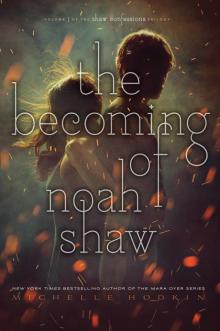 The Becoming of Noah Shaw
The Becoming of Noah Shaw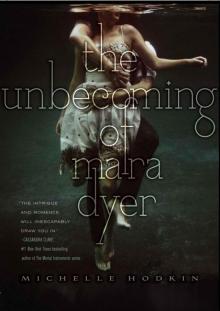 The Unbecoming of Mara Dyer
The Unbecoming of Mara Dyer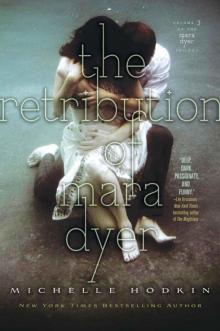 The Retribution of Mara Dyer
The Retribution of Mara Dyer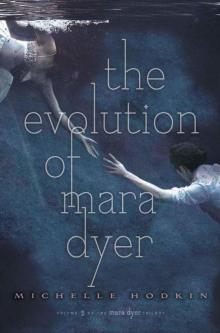 The Evolution of Mara Dyer
The Evolution of Mara Dyer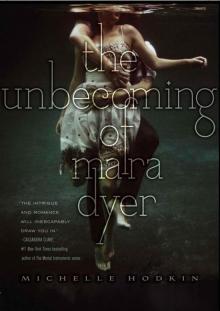 The Unbecoming of Mara Dyer md-1
The Unbecoming of Mara Dyer md-1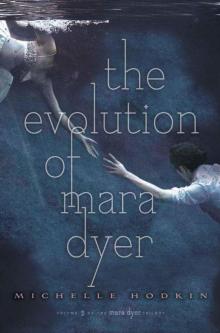 The Evolution of Mara Dyer md-2
The Evolution of Mara Dyer md-2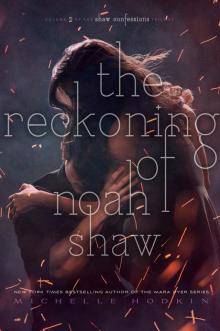 The Reckoning of Noah Shaw
The Reckoning of Noah Shaw